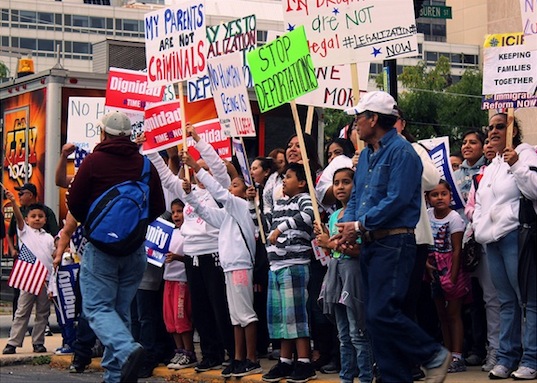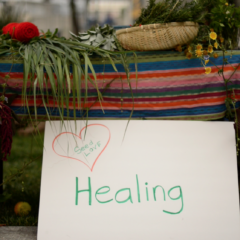(Photo by Stephanie Barto from Flickr Commons)
The response to President Obama’s brief but pointed reference to the need for immigration reform during his 2015 State of the Union address was predictably polarized. Under the headline “Dreamers at State of the Union Hope Obama Continues to Push Forward on Immigration,” the Huffington Post noted that Obama’s audience included 21-year old Ana Zamora and several other undocumented immigrants who came to the U.S. as children. NBC News, on the other hand, reported that Rep. Steve King (R-Iowa) lambasted the President for inviting a “deportable” to the event.
Back in November, Obama announced the he would take executive action in favor of some of the millions of undocumented in this country. According to current estimates, about 48 percent of the undocumented could potentially qualify for the relief offered by the President. The details and the qualification process are still not clear, but this action has created a great deal of anticipation among immigrant advocates and the Latino community in particular. On the other hand, Republicans in the House have taken action against the President by voting to defund Homeland Security unless he rescinds the action, and 17 states have sued the Obama administration in court to stop the implementation of the executive order.
President Obama’s action represents a victory for immigration activists. But it is merely a victory in the current battle. It is yet to be seen how the war on immigration will end. It is also not clear what impact this executive action will have on Latino voting patterns in the 2016 election and whether their vote will make a difference at the ballot box.
This flurry of activity—not to be confused with definitive progress—comes after a stretch of time during which the Obama administration proudly announced each year that it had deported more people than the year before. In fact, this President oversaw the deportation of more people than several previous administrations combined. Many Latinos had begun calling him the “Deporter in Chief.”
This most recent action represents a step toward the fulfillment of Obama’s 2008 promise to work toward immigration reform. But, because it is an executive action and only benefits about half of the undocumented, those of us in the faith community who work and live among the undocumented find ourselves caught between hope and frustration. We celebrate with the millions who will qualify for relief, but we know that we also have to provide pastoral care to those who now feel even more marginalized and have to continue working partly in the shadows until they also have a way to legalize their status.
President Obama did not clarify his policy toward those who do not qualify for relief. Will his administration continue its aggressive deportation policy toward the 52 percent who are not covered by the new policy? In particular, will it penalize those who did not get married and did not have children in the U.S.? What about those with American-born children, but who have been here less than five years? As with all previous proposals, including the one passed by the Senate, President Obama´s action leaves unanswered the question of what happens to those who have no criminal record, but still do not qualify. What does the President propose should happen to them?
Those who do not qualify will find themselves doubly marginalized. They will be treated as “illegals” and will bear the brunt of any potential backlash against the executive action. And they will be the second-class among the undocumented, since they were not included in the action in the first place. So we will continue to pray, to provide pastoral support, to work to change government policy and to continue decrying our broken immigration system. In particular, faith leaders need to be at the forefront of denouncing the Obama administration for taking a more aggressive deportation policy against newer immigrants, while providing executive relief to others. This two-faced policy demonstrates that the principle of justice and mercy toward all strangers is still not guiding our national conversation on immigration.
An important battle has been won. But the major task is still before us. We need an immigration reform package that addresses the needs of all those who are in the country without documents and that creates a legal, humane and fair way for future workers to come to the U.S. Anything less than that means that the task of fighting for justice for all is still incomplete.
Juan Martinez is a former fellow with the USC Center for Religion and Civic Culture.





